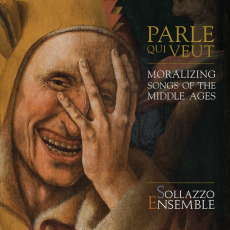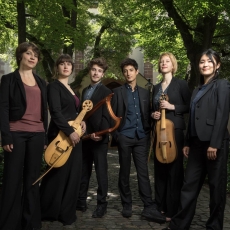Sollazzo Ensemble - Parle qui veut - musica Dei donum
In the short time of its existence the Sollazzo Ensemble has developed into one of the most celebrated formations in the field of medieval and early renaissance music. In 2014 it entered the Eeemerging programme, in which each year the most promising European ensembles are selected and offered artistic residencies in Europe, professional training and assistence in the ensembles' promotion through concerts. In 2015 the ensemble won the York Early Music International Young Artists Prize, and was awarded the Friends of York Early Music Festival Prize by the public, as well as the Cambridge Early Music Prize. The two discs reviewed here are the fruit of their successes. The Linn disc is part of the York Early Music Prize, and the Ambronay disc is the pinnacle of its participation in the Eeemerging programme.
I had the pleasure of attending three concerts of the Sollazzo Ensemble in recent years, once as part of the early music season of the Dutch Organisation for Early Music, and its two performances in the 2018 Festival Early Music Utrecht. I was greatly impressed by their performances, and the two present discs confirm my positive assessment of their interpretations. The choice of repertoire is also interesting, and in both recordings the subject of the programme has been worked out consistently.
Most medieval songs are about love, and that subject is not absent in the first dics's programme. However, the focus is on pieces with a moralizing character, as the subtitle says. In the Middle Ages there was much more room for social criticism than in later periods, and that comes clearly to the fore here. The main subject is slander and gossip, as expressed in the opening item, Il megli' è pur tacere, a ballata minima by Niccolò da Perugia. "It is best to be silent. He who speaks too much often errs". The sneakiness of gossip is perfectly expressed here by the way it sung. Some moralizing songs are satirical in character. That goes, for instance, for the second piece, by Giovanni da Firenze. In his ballata Angnel son biancho the text is put into the mouth of a lamb, and the music includes bleating sounds. Sound effects are also present in a special genre, the caccia. Andrea da Firenze's Dal traditor is about a traitor "who, by means of shrewd customs and false guidance presents a kind face". He is later compared to Judas, who betrayed Jesus. The disc also ends with a caccia: the two upper voices open the piece with a description of a hunting party, but are then interrupted by the third voice, quoting the cries at the marketplace. This song is reminiscent of a genre which was popular in the English renaissance.
In addition to Italian pieces we hear some on French texts, for instance the piece which gave the disc its title. Parle qui veut, an anonymous rondeau, in which the protagonist takes the slander in an almost philosophical way: "Say what you will, I would live loyally; it is my true desire and my perfect will. I will devote all my skill to loyalty as long as I live – to her, to whom I am dedicated."
Stylistically there is quite some difference between the Italian and the French pieces. In the latter we often find long legato lines, whereas many of the Italian pieces consist of short phrases and pauses. What they have in common, however, is that the text is given much prominence. It is an interesting thought that in the course of history the balance between text and music shifts continually. In large parts of the renaissance repertoire there is hardly any connection at all, and the seconda prattica tried to 'correct' that. There is certainly a clear relationship between text and music in the repertoire on this disc. A striking example is Pour che que je ne puis, an anonymous ballade in which the protagonist expresses his sadness about his departure from his beloved. "I depart against my will; but while parting from you, in leaving, I leave my heart to you". The two voices consistently cross each other, and the result is a strong harmonic tension, which poignantly expresses the pain of the protagonist. It is perfectly realised here by Yukie Sato and Perrine Devillers. The emphasis of the text also allows the performer to put his stamp on a piece; a performance is much more than reproduction of the notes, it is real interpretation. A good example is the way Vivien Simon, in Le basile, a ballade by Solage, vividly exposes the threat of the basilisk, a creature which figures prominently in medieval bestiaries.
Lovers of medieval music should not miss these two discs. I am looking forward to the ensemble's next projects.

